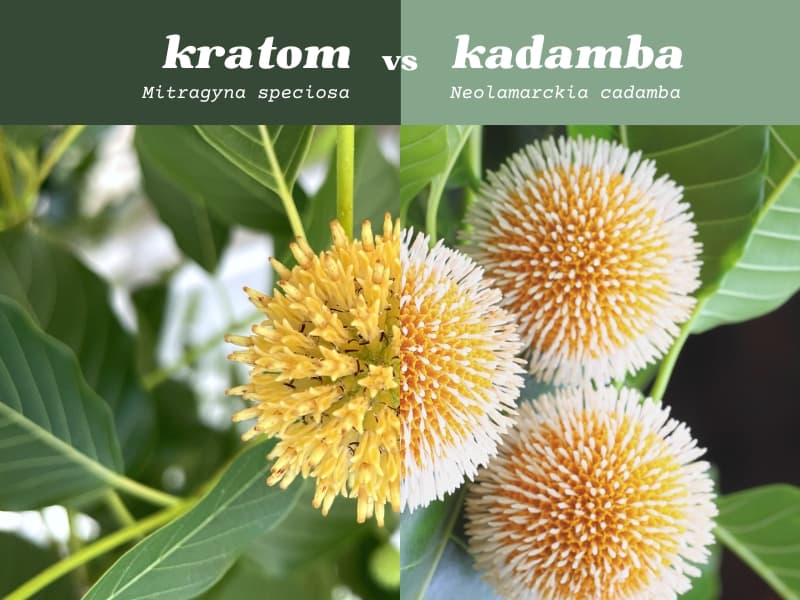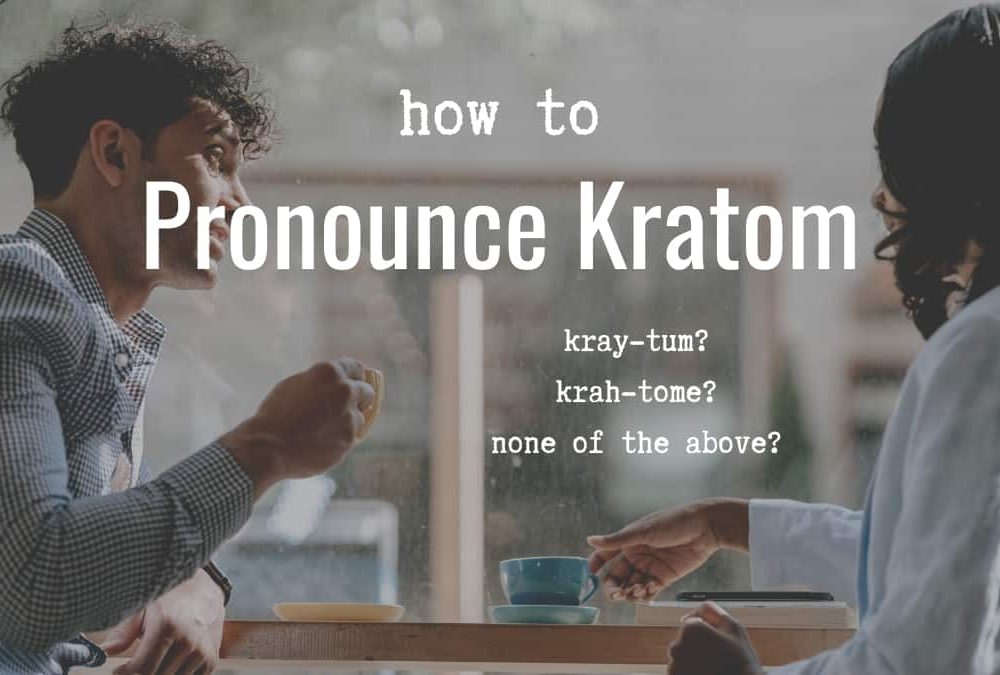If you’re new to kratom, you probably want to learn how to pronounce “kratom.” If you’re an experienced member of the kratom community, odds are, at some point or another, you may have heard people pronounce kratom differently.
So, what is the correct kratom pronunciation? How do you say “kratom” without sounding like a noob? Is there even a right way to pronounce kratom, or does anything go? Well, you’re about to discover that the answer is more interesting than you might think, so buckle up!
Background On Kratom Pronunciation
We’ll delve into the various ways to pronounce kratom below, but if you’ve frequented the Better Brewing Blog, you know we love to set the scene with some historical and botanical context.
Interestingly, the word “kratom” has evolved over time. If you’re a nerd for words, you may find the history of kratom etymology almost as fascinating and complex as the Mitragyna speciosa tree itself. To get to the bottom of this mystery, let’s take a look at how kratom’s history has profoundly affected its pronunciation.
The Origins of Kratom
When attempting to track the word “kratom” etymology, we must begin our search in Southeast Asia.
The kratom tree is native to Southeast Asia and has grown naturally in countries like Thailand and Malaysia for millennia. Farmers and laborers in the region traditionally used kratom by chewing the leaves of the plant to ease the toll of a long day of work in the tropical heat.
Mitragyna speciosa (kratom) is a tropical evergreen tree belonging to the Rubiaceae family, the “coffee family” (yep, coffee and kratom tea are from the same family!) Regarding botanical nomenclature, the Mitragyna speciosa tree’s scientific namesake is a bit of a mystery itself.
It has been widely accepted kratom’s genus, Mitragyna, was coined by Dutch botanist Pieter Willem Korthals. He supposedly chose the prefix mitra- because the leaves and stigmata of the plant bore a close resemblance to the shape of a bishop’s hat, called a mitre.
However, there is speculation that the namesake may actually derive from Mithraic cults, which were scattered throughout the Roman Empire during the 1st to 4th centuries CE.
As for the word kratom itself, there is a bit of controversy surrounding its origins as well.
Kratom Etymology

According to Isaac Henry Burkill, a 20th-century English botanist, kratom is likely derived from the Sanskrit word “kadam.” Kadam, or kadamba, is the common name for Neolamarckia cadamba, a tree with a storied history in South and Southeast Asia, specifically in the Hindu culture centered around the Indian subcontinent.
The etymology of kadamba is rooted in Sanskrit, where it has been used in many contexts for thousands of years. The Kadamba dynasty ruled a vast section of what is today India from 345 CE to 540 CE. The dynasty derived its name from the kadamba tree their mythological warrior-patriarch was born under.
Additionally, an interesting circumstantial link between kadamba and the modern-day kratom tree lies in a particular sect of Buddhism known as Theravada. In Theravada Buddhism, the story goes that Bodhisattva Sumedha was enlightened beneath a kadamba tree. Interestingly enough, Theravada Buddhism is practiced in countries like Thailand, Burma, and Laos, where kratom grows naturally.
Could “kadamba” have originally referred to the Mitragyna speciosa kratom tree rather than Neolamarckia cadamba? Could it be that, over time, storytellers have confused the two trees due to their similarly shaped flowers? There have been many instances of cultures bestowing psychoactive plants with spiritual significance.
These are interesting questions, but the truth is we will never know. Much of history has been lost or manipulated through word of mouth and time itself.
Have You Been Saying “Kratom” Wrong?
First of all, if you’re worried you’ve been saying “kratom” completely wrong, you should know there isn’t one “right” way to pronounce kratom. For lack of a better example, we have a bit of a” tomayto” vs. “tomahto” situation on our hands. Kratom pronunciation varies by region, and knowing how to say kratom depends on where and to whom you’re asking this question.
Don’t get us wrong; there are definitely more popular and less popular ways to say kratom, and some enthusiasts may want to correct you if you pronounce kratom differently from how they’re used to hearing it. However, chances are, you might be saying it one of the four most popular ways.
Different Ways to Pronounce Kratom in The USA
Now that we’ve set the historical scene let’s get into what you’re here for! While kratom pronunciation varies by language and region, in North America, there are two common ways to pronounce kratom: kray-tum and kra-tom. It’s hard to determine which is the more popular pronunciation of the two.
1. Kray-tum
- Rhymes with: Ultimatum
- Most popularly used: USA, Canada
If you live in North America, this first pronunciation of kratom is one that you’re probably already familiar with. To pronounce kratom this way, you pronounce the first part with a long “ay” sound (ā as in crate), and you say the second part as “uh.”
So, in this popular North American style of kratom pronunciation, “kratom” rhymes with “Tatum” (for any Channing Tatum fans out there).
You’re less likely to encounter this pronunciation of kratom outside of the US or Canada. While there aren’t many reliable statistics out there for the pronunciation of kratom (if any), kratom being pronounced with a long “a” seems to be growing in popularity.
This may be, at least in part, due to the rising popularity of the American Kratom Association (AKA). The AKA is at the forefront of the so-called “war on kratom.” They advocate for the kratom plant and kratom consumers on a global scale by pushing for pro-kratom legislation, such as the regulation of kratom in the US.
2. Kra-tom
- Rhymes with: atom
- Most popularly used: Numerous countries globally
Most languages utilize a short “a” (ă as in at) rather than a long one, so this pronunciation is probably the most “universal” way to say kratom; that is, it’s the most common pronunciation from country to country. The “krat” in this pronunciation rhymes with “cat,’ and, and the second part sounds like “Tom.”
Darshan Singh, a leading kratom researcher from Malaysia, promotes this way of pronouncing kratom as the closest English equivalent to the original Thai pronunciation. While the long “kray-tum” version is prevalent here in the United States, you may run into a “kra-tom” proponent stateside as well. With your newfound info, you’ll know they need not be corrected!
Other Ways to Pronounce Kratom: Around the World
While the aforementioned pronunciations of kratom are the most common ways to kratom in the US, they aren’t the only existing kratom pronunciations globally. Several other countries and cultures have their own unique pronunciations. Here are some of those less-common examples:
3. Key-tum / Keh-tum
- Rhymes with: “Freedom” or “Fed ’em”
- Most popularly used: Malaysia
Kratom is pronounced this way in Southeast Asian countries where kratom grows naturally, like Malaysia or Thailand. Malaysia remains one of the titans of the kratom production industry.
In these regions, it’s common to drop kratom’s “r” altogether and combine a long e (ē as in key) or “eh” sound with a standard “um” sound at the end. You’re more likely to encounter these pronunciations in Malaysia than in Thailand, as linguistic differences make these pronunciations difficult for some (see the next pronunciation for details).
4. Kruh-tome
- Rhymes with: “A home”
- Most popularly used: Thailand
In Thailand, kratom is roughly pronounced something like kruh-tome, wherein “kruh” is emphasized and “tome” rhymes with “roam.” This is a loose translation due to the fact that it is challenging to Romanize an accurate pronunciation.
The Thai alphabet and language use some fundamentally different letters than the Roman alphabet, making it difficult to equate the two. For instance, in Thai, the “k” sound in kratom is not aspirated. To aspirate a consonant is to forcefully expel air while pronouncing it. The lack of aspiration of the “k” in Thai causes it to sound more like something between a “g” and a “k” in English.
Side Note On Kratom Pronunciation
Keep in mind these are not the only ways that kratom is pronounced. The above list of examples simply only covers some of the most popular kratom pronunciations in North America and Southeast Asia. With so many different languages, cultures, and dialects around the world, there are too many pronunciations to name for this brief post.
Plus, as kratom grows in popularity, the current set of pronunciations will probably change and expand.
So What is the Right Way to Pronounce Kratom?
So is there a true “right” way to say kratom? In our humble opinion, no.
While you should be courteous and attempt to respect the culture of whatever company you may find yourself in, there is no “right” way to say kratom. There are simply a variety of different ways!
In addition, some pronunciations of kratom do not translate well from language to language. As with our Thai example, some alphabets even make the prospect of explaining the respective pronunciation rather difficult.
Furthermore, many countries simply don’t use the word “kratom” to refer to Mitragyna speciosa in the first place. When in doubt, you can always refer to kratom by its scientific name, Mitragyna speciosa. If anything, it shows you’ve done your research on kratom and might teach your companions something new!
Final Word: How to Pronounce Kratom
Now that we’re at the finale of the kratom pronunciation debate let’s do a quick recap of some of the more substantial points we’ve covered:
- The history of kratom spans several centuries, with possible references to the plant appearing in numerous religious stories and texts. While there is no concrete proof, some evidence points towards the word kratom being derived from the Sanskrit word “kadamba.” Despite this derivation, kadamba is actually the common name of an entirely different evergreen tree. Neolamarckia cadamba.
- The “kray-tum” pronunciation of kratom is widely popular in the United States. The American Kratom Association uses this pronunciation.
- There are several ways to pronounce kratom, each as valid as the next. Differences in pronunciation appear across cultures, countries, and languages, making a universal pronunciation next to impossible.
- Many languages don’t even use the term “kratom” to refer to M. speciosa, so there isn’t much need for debate! Be respectful of other cultures’ and countries’ pronunciation, and you can always use M. speciosa when in doubt.
Lastly, if you’re interested in consuming kratom the traditional way, you can check out our kratom tea shop for delicious kratom tea bags and unique kratom teaware!
Does Kratom Pronunciation Matter?
In the end, how you say kratom isn’t a huge deal. But, if you want to avoid being corrected by others, now you know what to say in response.
If you want to stick with what many US residents say at large, you can go with “kray-tum.” If you prefer to pronounce kratom in a way that’s closer to the native pronunciations of kratom and is more popular globally (and also used by Hamilton Morris and various kratom researchers), go with the “kra-tom” pronunciation.
Or, you can always mix it up if you’d like and use both, or throw in some of the Thai or Malaysian pronunciations of kratom. Either way, if you love the plant as much as we do, you’ll always be in good company in the kratom community. To learn more about the origins of kratom and the science behind it, check out our other fascinating kratom articles!





